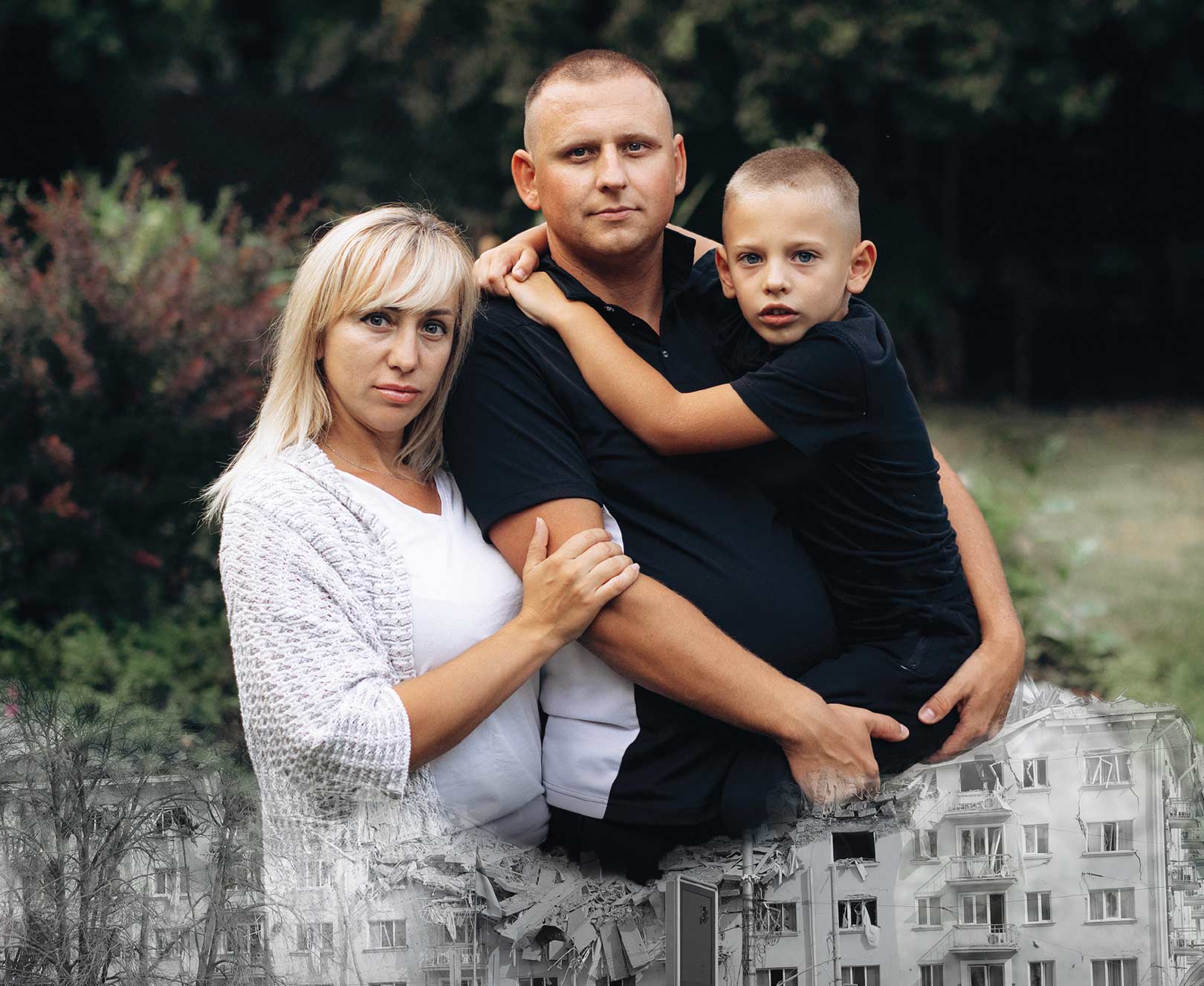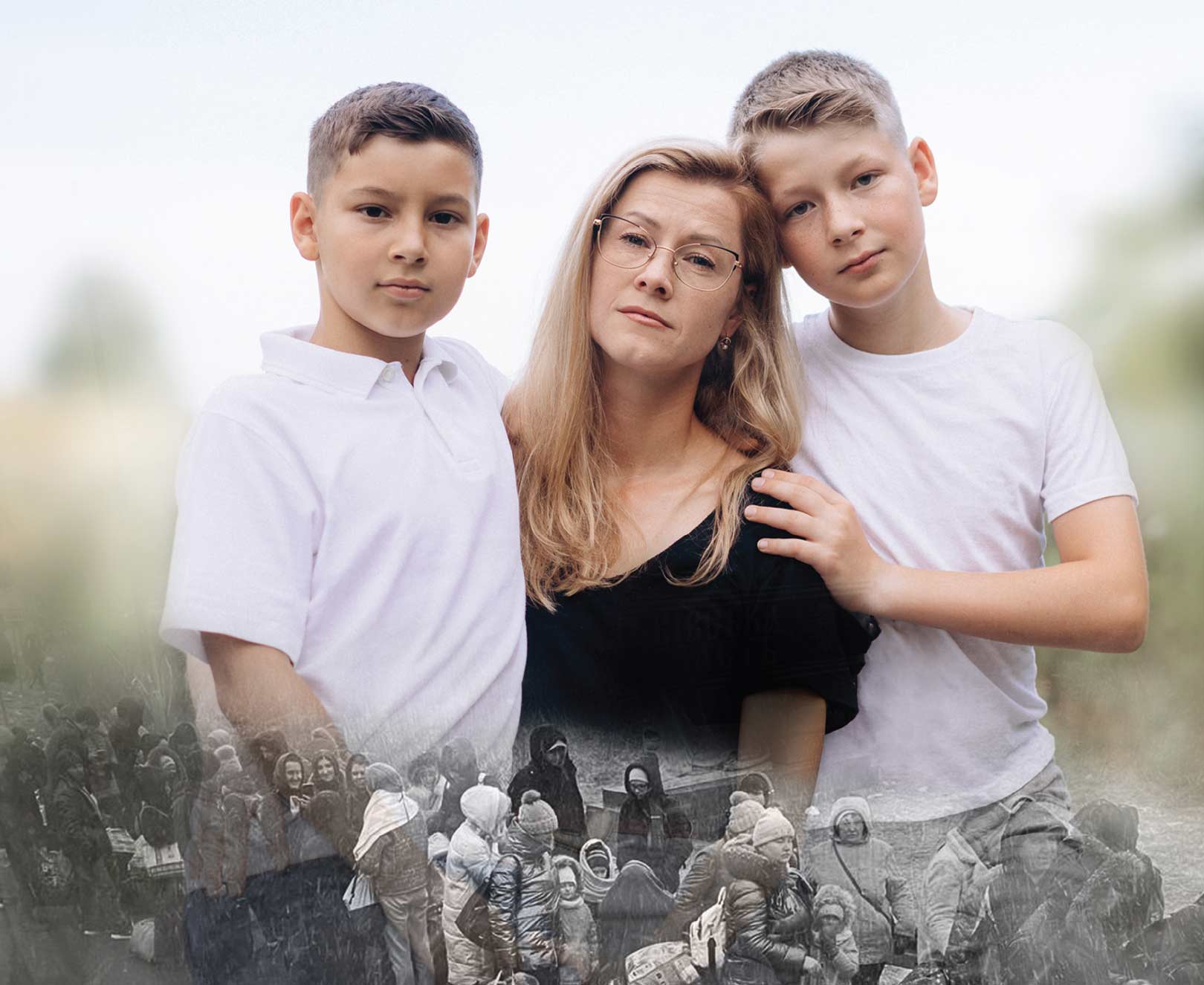
THE HIZIMCHUK FAMILY

NATALIA, DMITRY AND TIMUR ITSENKO

ANNA BIELOUSOVA AND HER FAMILY

YULIIA TISHALKOVA, SONS ZAKHAR AND MATVII

THE BULYSHEV FAMILY WITH DOG DEYA
The Russian invasion of Ukraine has devastated the country and left families scattered around the globe in search of peace and a new home. A few landed in our neighbourhoods. These are their unfolding stories.
It all began because of Emma Grace. She was premature, spent two months in the ICU in Kyiv, and before she was a year old the Russians invaded. “I realized we would move when the air raid sirens were sounding and I was running with Emma Grace in my arms to the shelter,” says her mother Olya. “I looked at her eyes and I saw fear.” Olya Hizimchuk, her husband Vlad, and Emma Grace left the next day. “It was a difficult decision but easier if we look at how Emma will grow up without war.” Four months and three countries later, they are one of thirty Ukrainian families in Port Hope. There are seven more in Brighton and two in Colborne. Farther east in Quinte and Prince Edward County there are still more.
When the 2016 census was conducted, only twenty people in Northumberland and Hastings counties spoke Ukrainian at home. That number has now increased nearly a thousand percent.
Nearly a quarter of a million Ukrainians have come to Canada over the last hundred years. Their descendants are better educated, have more highly skilled jobs and make more money than the average Canadian. These new Ukrainian immigrants look to be cut from the same cloth. Three weeks after Emma Grace and her parents arrived, Vlad was cutting hair at a barbershop in Cobourg. Olya had created her business card and was sewing and selling toys.
TO STAY OR NOT STAY? | Natalia and Dmitry Itsenko
Canadians invented the concept of sponsoring refugees – clubs, humanitarian groups and church groups have supported 327,000 refugees in the past forty years – but the war in Ukraine has changed all the parameters.
The Trinity-St. Andrews group in Brighton – forty or more people under the leadership of Reverend Wanda Stride – are helping the new arrivals from Ukraine find accommodation. “Don’t call them refugees,” the Ukrainian Canadian Congress said to the federal government. “Ukrainians need help, but we know they will want to go back when the war is over.” And so officially these Ukrainians are three year visitors with the right to work and to study. They walked out of their apartments in Ukraine with a suitcase and not much more. Beds were left unmade, gardens left to be harvested, businesses and often parents left behind. Will they go back or will they plant roots in Canada?
As opposed to refugees, visitors need an invitation, and the Brighton group looks for host families, people prepared to give up their spare bedrooms and share their bathrooms and their kitchens – basically to invite Ukrainians to live with them for months. It’s a big ask.
They walked out of their apartments in Ukraine with a suitcase and not much more.
Sitting near the front of the room over a garage in Brighton is Natalia. She and her husband Dmitry are both metallurgical engineers who worked at the massive steel plant in Kryvyi Rih – two of 26,000 employees. Their town was decimated in the early days of the war, and they fled with their six-year-old son Timur, first to Moldova then to Bulgaria. They arrived in Brighton on July 1, where they met Bev and Gord and moved into a room over their garage. “We watched the fireworks the night they arrived.”
Why did Bev do this? “Don’t make me cry,” she says. “I want to think that if my kids and my grandkids needed help, someone would do this for them.”
It’s that simple.
The Brighton group has ESL teachers, drivers and $12,000 in the bank. Wanda Stride is realistic: “We hope we can help five families,” she says. Every organization is making it up as they go along, just as every Ukrainian has their own story.
THE END OF THE RAINBOW | The Bielousov Family
It was 3:00 a.m. on April 19 when they arrived in Northumberland County from Pearson, and all they could see were the shadows of trees overhanging the road. The car stopped and lights in the house went on. When Anna Bielousova, her husband, their three girls and Anna’s mother got out of the car, they were looking at a huge old house, with gardens, paddocks and stables and a man and a woman smiling at them. “It was like a fairy tale,” Anna says, shaking her head, still hardly able to believe it. They would spend the next six months living at Batterwood, the former estate of the first governor general born in Canada, Vincent Massey. Where else do you put a family of ten? Her father and her three boys were still in Poland waiting for their visas, which would arrive six weeks later.
As the Russian troops were gathering on Ukraine’s borders the Bielousovs watched “What to Do” videos on YouTube at home in Kyiv. (It is the technologically literate who have fared best in the Ukrainian exodus.) Leave in the first three hours after the invasion, the videos told them. They were on the road within half an hour of the first missile strikes, heading for the western border. Her parents left two hours later – those two hours meant two more days on the road.
In Ukraine the Bielousov company, Air, which employed 225 people, provided media and text services for video bloggers. As the family left, they emailed and texted employees and said, “Join us”; fifteen families did. What was now a convoy was ten days on the road. They pushed through Romania and stopped only when they reached Poland, where they lived together in a small hotel that the Polish government had turned into a guest house for refugees. They were thirty adults and forty children, looking for an invitation to come to Canada. Every laptop was up and running. As Anna said, “You must knock on every door.” One of their employees knew a Canadian woman from Port Hope named Olena Hankivsky. They knocked, and the door was opened.
Hankivsky, a Canadian academic who has done social policy research in Ukraine over the past twenty five years, is a steely minded woman. “I do not make promises I cannot keep,” she says. Remarkably, she mustered a hundred and fifty volunteers in Port Hope, found host families, raised the money and kept her promise to bring in thirty families and support them for six months.
BLOSSOMING UNDER THE RUBBLE
“War solidified Ukraine,” says Alex Derzhavin owner of Stillus Craft Spirits, a Ukrainian artisanal distillery in Prince Edward County. “Our culture was destroyed. If you spoke Ukrainian it was almost as though you were a country hick. Speak Russian and you were more sophisticated.” Not anymore. Now there is some pride in being Ukrainian. That’s new.
The Ukrainians who are now shopping in our grocery stores and sending their children to school in Belleville and Brighton and Port Hope are, for the most part, young, well-educated middle class people.
“The people forced by war to leave today have done well in the new Ukraine,” Alex notes. Many of the young work for international companies, the salaries are good and the cost of living is not so high.
They come with qualifications and confidence.
Families reinvented themselves when the Soviet Union fell and reinvented themselves again as their government shed its Soviet skin. And now it is happening again. At least fifteen of the families in Port Hope have worked for the Bielousov’s company Air. At Batterwood, Anna Bielousova’s husband Sergii was running the company from upstairs when I talked to her. Currently, eighty percent of the staff is still in Ukraine, a few are in California, fifteen percent are somewhere in Europe and the rest are here. Air is now operating across ten time zones, a multi national company headquartered in Port Hope.
WOMEN AND CHILDREN FIRST | Yuliia Tishalkova
“We used to live in Lviv,” says Yuliia Tishalkova as she sits in a park in Port Hope. “I had a wholesale produce business.” Lviv is an old, very European city in western Ukraine with an elegant opera house at one end of the town square. That morning last February when her husband told her the war had started, she could not believe it. “No, this is the twenty-first century. It cannot be.” Then there were missile strikes near their house. The children were crying and everyone sat outside all night near their apartment building. Her husband said to her, “Go.” She protested, “How can I go without you?”
But the rules were clear: men between 18 and 60 could be called up for military service and could not leave Ukraine. So Yuliia and the boys – Matvii, 11 and Zakhar, 12 – boarded the bus for Poland. There were 72 buses full of women and children ahead of them, and when they approached the border she looked out the window and saw endless lines of women and children on foot, as the snow began to fall. Polish people went down the line tearing blankets in half, giving everyone at least something to keep them warm.
Yuliia joined a friend who had fled to her parents’ house near Wroclaw in Poland, where they thought they would stay for two or three weeks. It was three months. “The whole house was full of women and children,” she says. She even found a little work under the table – planting, watering and weeding; but with tens of thousands of Ukrainians flooding into Poland, real jobs were going to be hard to find. Then her husband heard about a Canadian program for Ukrainians, and Yuliia nervously began the search for someone to “invite” them. That’s when she too found Olena Hankivsky. “I think I can help you,” Olena said. But Yuliia answered “I am from Ukraine; I can’t believe anything. Really, who are you? Who paid for you?” Who to trust? Olena gave her the phone number of Anna Bielousova – now in Canada – who reassured her. “It’s real, It’s so perfect. It’s like in heaven,” Anna told her. Then Yuliia What’s-App’d the people who would be her host family. “I can see how they look like. I saw very kind, nice person. They tell me, you can come. After this I understood they really want to help.”
Yuliia Tishalkova is one of millions of Ukrainian women who have left Ukraine with their children. Most will not get beyond Poland, but Yuliia is here. She has gotten her Canadian driver’s licence; she has had job interviews; the boys are in school (“math is too easy,” they say); they sing in a church choir. She says her husband gets depressed back in Ukraine, “but he is happy we are safe.” Now she’s a single parent in a new country, desperately hoping that she won’t become a widow in a new country.
When the first missiles came down on the Black Sea city of Odessa their first instinct was to stock up on groceries and hunker down.
HAPPY LANDING | The Bulyshev Family
Then there are the Bulyshevs in Belleville – Denys and Tetiana and their children: Dmytro, 10, Oleksii, 7 and Anastasiia, 3. Denys Bulyshev was head of real estate for Kyivstar, a mobile phone company with 26 million subscribers. Then he started his own construction company, rebuilding schools. Because he had three children under eighteen, he obtained a military exemption and was allowed to leave Ukraine. When the first missiles came down on the Black Sea city of Odessa their first instinct was to stock up on groceries and hunker down. They changed their mind hours later and headed for their dacha half an hour outside the city. The military planes went over, the windows shook and after three days they drove farther south to Izmail and then Romania (they thought they would be safer in a NATO country). They applied for visas to both the UK and Canada and did their homework, looking at the numbers in both countries – at economic growth and job creation. And the less measurable qualities: “In England we cannot be like native people because there are not a lot of immigrants. In some time we will be like native people in Canada.” Canada was a calculated decision.
“I saw very kind, nice person. They tell me, you can come. After this I understood they really want to help.” YULIIA TISHALKOVA
Fate dealt them a good hand. The owner of the airbnb where they stayed in Romania had immigrated to Montreal twenty-five years earlier. They phoned her. “For you Canada is the best choice,” she told the family. “Adults have to work hard if they want to get ahead, but for the kids, this country will do everything for their good life.” That did it. Soon after they arrived in Belleville, the Bulyshev family drove to Montreal and did two things: They thanked their new Romanian friend and then found the Ukrainian Orthodox church “to hear our language and to give thanks,” they say, smiling. An orthodox icon is perched above the thermostat on the living room wall in their Belleville apartment.
Good connections led the Bulyshevs to Belleville real estate agents Doug Peterson and his partner, Judy Rufo, who were prepared to give a Ukrainian family an apartment rent-free for a year. The Bulyshevs became their family. When they all arrived in Belleville the kids were uncertain and clinging to Tetiana. But Doug had found out that the boys, Dmytro and Oleksii, were into judo, and Judy had hung pictures of famous judo athletes and put the boys’ names on the wall over their new beds. Now there were smiles.
Today Denys Bulyshev is managing a construction project and wading through the bureaucracy to get his Ukrainian credentials recognized; Tetiana’s accountancy degree has already been accredited and she is working in her field. A menswear store gave Denys a wardrobe for work; they have bought a car; their little girl has a spot in daycare and the boys are at camp waiting to go back to school (they too say that Canadian math is too easy). They are already talking about buying a house.
Will they go back to Ukraine when the war is over? Historically, twenty percent of displaced peoples have gone back. Olya in Port Hope and Tetiana in Belleville hesitate and look down when the question comes up. But they know they will stay. Emma Grace, Dmytro, Oleksii and Anastasiia, the six Bielousov children, Timur in Brighton and Matvii and Zakhar in Port Hope, will all be cheering for the Blue Jays before they hit high school. But for their parents and grandparents there will be an ache – always.
THE TIES THAT BIND
The old cliché that blood is thicker than water runs true throughout the odysseys of those driven from their homes. Wrenched apart from family and loved ones, they will always look for a way to be together again.
FRIENDS OF THE FAMILY
Deya Bulysheva has been in and out of five airports and travelled more than 13,000 kilometres on her way to Canada. When the first missiles were fired on Odessa, she was very pregnant. Her family was packing to leave when she delivered – seven puppies.
Deya is a champion standard schnauzer.
“If you take her now, the puppies will die,” the breeder said, and so Deya stayed and nursed her puppies as the war escalated. The breeder looked after her, the puppies thrived and she waited.
It’s not easy getting a dog out of the country in the middle of a war. Once the Bulyshevs settled in Belleville, the breeder got Deya on a plane in Odessa (quite how is a mystery), and she flew to Moldova, then on to Warsaw. Someone got her safely on a connecting flight to Amsterdam and an animal-loving Dutch woman put her on the plane to Toronto. A little confused Deya tottered out of her travel crate into the welcoming arms of her family and is now bounding around the living room in Belleville.
Anna Bielousova packed up her family in Kyiv and put some food down for their two huge Maine Coon cats. They would just be gone for a couple of days, she thought. “No,” said her husband, “it could be longer. Bring them.” And the cats were unceremoniously packed into the car. “Longer” indeed. They sat with the rest of the family in two rooms in the Czech Republic for ten weeks. But they got on the plane and came to Canada with the rest of the family.
THEY HAD THE DEVIL ON THEIR TAIL
Mira Knott, the photographer for this story – Gamazonova is her Ukrainian name – was living in Colborne when the war started. She was the family princess: her Ukrainian family had always looked after her. Suddenly the roles were reversed and Mira became their lifeline. “They watched the red lines of the missiles as they flew over Irpin. My parents slept in their cellar. My sister and her kids … they were sleeping under the stairs.” Then they started to run; Russian forces bombarded a road where civilians were fleeing. Three hundred civilians and fifty soldiers were killed in Irpin.
Mira came to Canada when she was 18 to intern at Catch the Fire, a school of ministry in Toronto. She met a man from Cobourg and married him. With the onset of war, she and her in-laws were raising money for her family and doing what they could. “We got my parents an airbnb in Hungary. It was one of the few things you could do.” They got out of Ukraine on American visas and flew to New York, where they stayed until their Canadian visas came through. It was two months after they left Irpin before they got to Colborne. Mira was on the phone to them every day, wearing their fear.
Now that they are in Canada, she continues to protect them, still suspicious of anything – someone speaking Russian at the beach one day in the summer. “My family, because they are [evangelical] Christians got lots of persecution from Russians. My dad is a pastor. I am really careful.”
This summer a far more mature Mira Knott turned 27. There were balloons tied to her veranda in Colborne, and cake. Her parents, her siblings and her nieces and nephews were all with her. Will they stay? “It is an impossible question. We don’t know anything. I am trying to set them up so they can get on their own feet. It takes a lot of people and resources to put someone on their feet from scratch.”
“My parents slept in the cellar. My sister and her kids were sleeping under the stairs.” MIRA KNOTT
THE DECISION TO RETURN
Twenty-eight-year-old Dasha was in Spain when the Russian forces invaded. She works in digital marketing, and her multinational company was holding a conference in Barcelona. Everyone scrambled. The company with its international connections flew her to Dubai. Then in March, with her warm weather clothes in her suitcase she flew to Toronto to her Canadian family.
Her uncle, Alex Derzhavin had come to this country twenty years earlier and built a new life for himself. Most recently he and his wife Lucy started Stillus Craft Spirits, an artisanal distillery in Prince Edward County. They were launching the business as the war began. The family is from Zaporizhzhia, the site of the largest nuclear power station in Europe, currently occupied by Russian forces. Her father, Alex Derzhavin’s brother, will not leave, even to go to western Ukraine let alone Canada. “What would I do in Canada?” he asks. He drives for the Ukrainian army; his wife cooks for them.
“Stay,” said Uncle Alex to his niece. “There is another life for you here.” He is an MBA graduate, a successful entrepreneur who feels more at home here than in Ukraine these days. The family in Canada would take care of Dasha. She is a young vital woman, full of energy – a Ukrainian champion hip hop dancer – with a profession that could be practised in Canada. But the longer Dasha stayed the more unhappy she became. Dasha had a good life back home in Ukraine, a supportive family and a steady income. But in Canada, her uncle says, “Her life was unbalanced.”
At the beginning of the summer she got on a plane and flew back to Ukraine, not just back to Ukraine but back to Zaporizhzhia, perhaps the most dangerous place in the country. Not everyone stays.
Editor’s Note: We have tried to be faithful to the Ukrainian spelling of names and places. When spelling a female Ukrainian surname, the letter “a” is often added to the end.
Story by:
Karin Wells
Photography by:
Mira Knott


